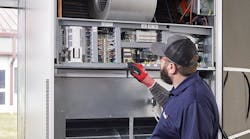While spring is great for warmer temperatures and blossoming flowers, the season can be problematic for K-12 schools looking to deliver fresh, clean air to their students. Seasonal allergies can create disturbances in a child’s ability to learn. According to the Children’s Hospital of Philadelphia, symptoms of seasonal allergies can include a stuffy or runny nose, sneezing, itchy eyes and nose, sore throat and cough. In addition, these allergies can also cause fatigue and poor concentration in school due to lack of sleep, an increase in ear and sinus infections, asthma exacerbations and behavioral issues from discomfort.
Mechanical HVAC systems provide the perfect solution to help combat seasonal allergies, but it’s important to have them prepped and ready for when the pollen begins to invade our air space. Managing the three main components of indoor air quality (IAQ)—filtration, ventilation and humidity control—schools can provide excellent air quality while also giving their students and staff an excellent experience.
HVAC Preparation
Ventilation, filtration and humidity controls are all vital when enhancing IAQ. Ventilation is a necessity to ensure clean fresh air is being pushed into the classrooms. It’s important for facility managers to make sure the minimum amount of outside air is being introduced into the space so students and faculty are getting an ample amount of fresh air. If a room is under-ventilated, indoor air pollutants may not be effectively diluted. If the space is over-ventilated, your HVAC unit may be working harder than it needs to without providing comparable results. In addition, this will also result in wasted energy and wasted money. Ensure that your HVAC unit’s ventilation controls are on a setting that maximizes output.
The next area of focus should be your unit’s filtration system. While bringing in fresh air is extremely important, your system’s filtration capability is needed to filter out allergens. ASHRAE recommends commercial facilities use MERV 13 filters to provide a greater defense against allergens and airborne pathogens if your HVAC unit is compatible. These filters can eliminate particles as small as 0.3 microns such as dust/pollen, auto exhaust and mold spores.
Humidity can also play a role in allergens during the spring. If humidity is too low, allergens can dry up and flake off into the air. Drier air can also make students’ nasal passages and throat dry out, causing even more irritation from allergens. On the opposite side of the spectrum, high humidity can promote mold growth, which will increase the number of mold spores in the air. Humidity controls allow facility managers to set the relative humidity in the space. It is ideal for humidity to remain between 40-60% to maximize comfort.
Possible HVAC Upgrades
Upgrades to your HVAC system can provide additional protection against allergens in the air. Filtration upgrades, like Needlepoint Bipolar Ionization (NPBI), can provide an extra defensive layer during the spring. NPBI works by releasing ions into the airstream using an existing HVAC unit as the delivery method. Once those ions are released, they form bonds with particles in the air. These bonds create larger clusters of particles, which makes them easier to filter from the air.
A ceiling-mounted ultraviolet air disinfection system can also be installed in schools to further aid HVAC systems in providing clean air. While these units are installed separately from the existing HVAC system, they can assist in minimizing the number of particulates in the air. Using an ultraviolet germicidal irradiation (UVGI) chamber and air circulating fans, airborne pollutants are drawn into the chamber, where the pollutant is neutralized by UV-C.
Systems like these can improve IAQ by assisting your current HVAC unit in eliminating airborne pollutants and pathogens.
Preventative Maintenance
While you may be making all the necessary changes and upgrades to ensure your HVAC solution is prepped for spring, preventative maintenance is the glue that holds everything together. Preventative maintenance is necessary to provide optimal performance. One of the best ways to maintain maximum efficiency is to develop a maintenance plan that includes a factory-certified unit inspection. Regular inspections are included in most maintenance agreements. There are several things facility managers can expect during an inspection:
- Installation of new filters
- Cleaning external surfaces, in addition to cleaning and vacuuming inside the cabinet
- Checking all electrical connections and mechanical connections
- Checking the condensate drain line (on high efficiency units)
- Brushing and vacuuming all the coils
- Checking and recording operational data of cooling or heating operations
Having your school’s HVAC system maintained regularly will not only ensure it’s providing excellent IAQ, but it’s also extending the life of the system while reducing energy consumption.
Ready for Spring
The pretty flowers that bloom during spring come with the trade-off of seasonal allergies. Pollen can create uncomfortable conditions for students in K-12 classrooms because of the adverse effects they cause. Mechanical HVAC units provide a greater defense against these troublesome particulates. Using controlled ventilation, filtration and humidity controls, facility managers are well-equipped with what they need to maintain great IAQ. With proper maintenance, these units should provide excellent results throughout the spring season.


